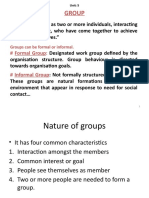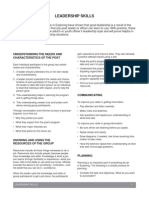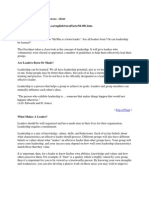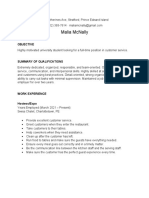0 ratings0% found this document useful (0 votes)
21 viewsGP Leadership
GP Leadership
Uploaded by
jillrose.escubio1984Groups require leadership to guide them towards their goals, and leaders can shape the future of the group by coordinating and motivating members; effective leaders emerge when members feel success is achievable through group effort, the rewards of success are valued, and an experienced individual is present. Good leaders determine how much and how to structure leadership, when to intervene and how to do so successfully, and how to manage collective anxiety and resolve other issues. A leader's personality, character traits like presence and courage, basic skills like active listening and summarizing, understanding of group dynamics, cultural differences, and use of voice and energy are important influences on group process and leadership style
Copyright:
© All Rights Reserved
Available Formats
Download as PDF, TXT or read online from Scribd
GP Leadership
GP Leadership
Uploaded by
jillrose.escubio19840 ratings0% found this document useful (0 votes)
21 views12 pagesGroups require leadership to guide them towards their goals, and leaders can shape the future of the group by coordinating and motivating members; effective leaders emerge when members feel success is achievable through group effort, the rewards of success are valued, and an experienced individual is present. Good leaders determine how much and how to structure leadership, when to intervene and how to do so successfully, and how to manage collective anxiety and resolve other issues. A leader's personality, character traits like presence and courage, basic skills like active listening and summarizing, understanding of group dynamics, cultural differences, and use of voice and energy are important influences on group process and leadership style
Original Title
GP_Leadership
Copyright
© © All Rights Reserved
Available Formats
PDF, TXT or read online from Scribd
Share this document
Did you find this document useful?
Is this content inappropriate?
Groups require leadership to guide them towards their goals, and leaders can shape the future of the group by coordinating and motivating members; effective leaders emerge when members feel success is achievable through group effort, the rewards of success are valued, and an experienced individual is present. Good leaders determine how much and how to structure leadership, when to intervene and how to do so successfully, and how to manage collective anxiety and resolve other issues. A leader's personality, character traits like presence and courage, basic skills like active listening and summarizing, understanding of group dynamics, cultural differences, and use of voice and energy are important influences on group process and leadership style
Copyright:
© All Rights Reserved
Available Formats
Download as PDF, TXT or read online from Scribd
Download as pdf or txt
0 ratings0% found this document useful (0 votes)
21 views12 pagesGP Leadership
GP Leadership
Uploaded by
jillrose.escubio1984Groups require leadership to guide them towards their goals, and leaders can shape the future of the group by coordinating and motivating members; effective leaders emerge when members feel success is achievable through group effort, the rewards of success are valued, and an experienced individual is present. Good leaders determine how much and how to structure leadership, when to intervene and how to do so successfully, and how to manage collective anxiety and resolve other issues. A leader's personality, character traits like presence and courage, basic skills like active listening and summarizing, understanding of group dynamics, cultural differences, and use of voice and energy are important influences on group process and leadership style
Copyright:
© All Rights Reserved
Available Formats
Download as PDF, TXT or read online from Scribd
Download as pdf or txt
You are on page 1of 12
Wesleyan University-Philippines
Graduate School
GROUP PROCESS
GROUP LEADERSHIP STYLE AND PROCESS
Ptr. John Paul C. Leabres, EdD, LPT, RGC
THE LEADER
Groups generally require guidance as they strive to reach their goals,
and the individual who coordinates and
motivates the group can fundamentally shape the group’s future
“Groups prosper when guided by good
leaders”
When Do Leaders Emerged
(1) members feel that success on the group task is
within their reach,
(2) the rewards of success are valued,
(3) the task requires group effort rather than individual
effort, and
(4) an individual with previous experience in the
leadership role is present in the group
As A Leader….
1. How much leadership to exercise
2. How to structure the group
3. When to intervene
4. How to effect a successful intervention
5. How to manage the group’s collective
anxiety
6. How to resolve other issues
Reasons for
Leading Groups
1. Efficiency
2. Experience of Commonality
3. Greater Variety of Resources
and Viewpoints
4. Sense of Belonging
5. Skills Practice
6. Feedback
7. Vicarious Learning
8. Real-Life Approximation
9. Commitment
PERSONALITY
AND CHARACTER
Group counseling techniques
cannot be divorced from the
leader’s personal
characteristics and behaviors
• Presence
• Personal Power
• Courage
• Willingness to Confront
Oneself
• Sincerity and Authenticity
• Sense of Identity
• Belief in the Group Process and
Enthusiasm
• Inventiveness and Creativity
BASIC SKILLS FOR GROUP LEADERS
Active listening
Tone setting
Reflection
Modeling and self-disclosure
Clarification and questioning
Use of eyes
1. Scanning for nonverbal cues
2. Head nods, Facial Expressions, Tears, Body Shifts
3. Getting members to look at other members
4. Drawing out members
5. Cutting off members
BASIC SKILLS FOR GROUP LEADERS
Summarizing
Use of voice
1. Use of Voice to Help Set the Tone
2. Use of Voice to Energize the Group
3. Pacing the Group
Linking
Use of the leader’s energy
Identifying allies
Encouraging and supporting
BASIC SKILLS FOR GROUP LEADERS
Mini-lecturing and information giving
Make it interesting.
Make it relevant.
Make sure you have considered cultural and gender
differences.
Make it short (usually no more than 5–8 minutes).
Make it energizing.
Make sure you have current, correct, and objective
information.
Multicultural understanding
Assignment:
(Please take note of the
number of Words)
You might also like
- Resilient by Rick HansonDocument21 pagesResilient by Rick Hansonolha100% (6)
- mcd2050 WK 4 Quiz 2020 01Document3 pagesmcd2050 WK 4 Quiz 2020 01Maureen EvangelineNo ratings yet
- Fiat Q SF 2014Document2 pagesFiat Q SF 2014humandudecNo ratings yet
- Group Dynamics NSGDocument11 pagesGroup Dynamics NSGJennifer Dixon100% (1)
- Group DynamicsDocument5 pagesGroup Dynamicsnehatiwari1805100% (1)
- Leadership (NSTP)Document45 pagesLeadership (NSTP)dalidaannefrancineNo ratings yet
- Module Review DynamicsDocument22 pagesModule Review Dynamicstinybacani28No ratings yet
- Team WorkDocument28 pagesTeam WorkSrinivasan ThiagarajanNo ratings yet
- Procedure Group CounselingDocument13 pagesProcedure Group CounselingargasatrioNo ratings yet
- Group Leadership in Occupational TherapyDocument74 pagesGroup Leadership in Occupational TherapyMarielleRaydelValNo ratings yet
- GROUP1Document10 pagesGROUP19755895939No ratings yet
- Group Development: Bambi Rose M. EspañolaDocument20 pagesGroup Development: Bambi Rose M. Españolabambi rose espanolaNo ratings yet
- Role of LeaderDocument13 pagesRole of Leaderparvnar.ya9xxNo ratings yet
- LEADERSHIPDocument30 pagesLEADERSHIPKenjoh Lo SenNo ratings yet
- Groups and TeamsDocument9 pagesGroups and TeamsDarlene TigcalNo ratings yet
- Case Study 2Document16 pagesCase Study 2kevindelig45No ratings yet
- HBO Chapter 7 - Work-teams-and-GroupsDocument20 pagesHBO Chapter 7 - Work-teams-and-GroupsYvone Claire Fernandez SalmorinNo ratings yet
- Chapter 8 SlidesDocument24 pagesChapter 8 Slidesfarayi.gadahNo ratings yet
- Module Review in Group Dynamics - 061703Document20 pagesModule Review in Group Dynamics - 061703Alyssa Jean ArcaNo ratings yet
- Leadership: Building Blocks of LeadershipDocument19 pagesLeadership: Building Blocks of LeadershipVinay GoddemmeNo ratings yet
- Leadership PPT - MANAGEMENTDocument11 pagesLeadership PPT - MANAGEMENTtosk451No ratings yet
- Principles of Management: Dr. A. Rashid KausarDocument30 pagesPrinciples of Management: Dr. A. Rashid KausarzrdNo ratings yet
- Lecture4 NSTPDocument33 pagesLecture4 NSTPitskimheeeyNo ratings yet
- Group 12Document34 pagesGroup 12Shareeda RayosoNo ratings yet
- Midterm Reviewer CwtsDocument7 pagesMidterm Reviewer CwtsNayeonie imNo ratings yet
- 2ND Observation Teamwork Leadership InsportsDocument27 pages2ND Observation Teamwork Leadership InsportsOlan MagcalasNo ratings yet
- Team Management Module 1Document5 pagesTeam Management Module 1Patrick MedinaNo ratings yet
- Team DevtDocument27 pagesTeam Devtmark musoreNo ratings yet
- Group: Two or More Individuals, Interacting and Interdependent, Who Come Together To Achieve Particular ObjectivesDocument68 pagesGroup: Two or More Individuals, Interacting and Interdependent, Who Come Together To Achieve Particular ObjectivesRahul RastogiNo ratings yet
- Leaership SkillsDocument3 pagesLeaership SkillsmbahnasawiNo ratings yet
- 2015-2016 Leadership For Food Services StaffDocument25 pages2015-2016 Leadership For Food Services StaffTotdi Aicrag100% (1)
- Teamwork & Interpersonal Relations FinalDocument95 pagesTeamwork & Interpersonal Relations FinalTNo ratings yet
- Leadership AND Interpersona L SkillsDocument18 pagesLeadership AND Interpersona L SkillsPriyanka AnvekarNo ratings yet
- Effective LeadershipDocument35 pagesEffective LeadershipGerald Fontanoza100% (1)
- QualitiesDocument24 pagesQualitiesNipar ShahuNo ratings yet
- Aba 2133 - Week 3 Group LeadershipDocument23 pagesAba 2133 - Week 3 Group LeadershipruziyanaNo ratings yet
- Small Lead TeamDocument13 pagesSmall Lead Teamnatnael denekeNo ratings yet
- Nstp1 Group 4Document31 pagesNstp1 Group 4Renato Dongito Jr.No ratings yet
- Assigment Midterm 3Document3 pagesAssigment Midterm 3Nichole AlbaracinNo ratings yet
- Prepared By: Id Number: Sarah Al-Atawi: 20082513Document7 pagesPrepared By: Id Number: Sarah Al-Atawi: 20082513haneeen_alrooohNo ratings yet
- Sle Leadership PaperDocument8 pagesSle Leadership Papere71921130No ratings yet
- Leadership Theories and Leadership Styles HandoutDocument6 pagesLeadership Theories and Leadership Styles Handoutedwin dullano100% (2)
- Groups Dynamics and TeamworkDocument26 pagesGroups Dynamics and TeamworkbijuajitheshNo ratings yet
- Chapter 5 - Group DynamicsDocument7 pagesChapter 5 - Group DynamicsLord GrimNo ratings yet
- Group ProcessDocument32 pagesGroup ProcessAswathiNo ratings yet
- Team Behavior and ToolsDocument16 pagesTeam Behavior and ToolsmichsantosNo ratings yet
- BBA 3651 Leadership - UnitVIIDocument7 pagesBBA 3651 Leadership - UnitVIIRikaNo ratings yet
- LEADERSHIPDocument55 pagesLEADERSHIPagnes a. factor100% (2)
- Mc&ob 5 UnitDocument9 pagesMc&ob 5 Unitshubham singhNo ratings yet
- Group and Work Group Behavior. Ppp..Document36 pagesGroup and Work Group Behavior. Ppp..Dharz Daryl100% (2)
- LS1 FinalsDocument10 pagesLS1 FinalsmadsbectaNo ratings yet
- NSTP PremidDocument38 pagesNSTP PremidJoanne LagusadNo ratings yet
- OB Chapter 2Document26 pagesOB Chapter 2habteNo ratings yet
- NSTP Chap 4Document34 pagesNSTP Chap 4Cydel MartinezNo ratings yet
- Participative ManagementDocument71 pagesParticipative ManagementAngie FiguraNo ratings yet
- A Happy Worker Is A Productive Worker: LeadershipDocument18 pagesA Happy Worker Is A Productive Worker: Leadershipheni susilowatiNo ratings yet
- CFLM2 Module1Document3 pagesCFLM2 Module1overpoweredikeNo ratings yet
- Develop Your Leadership SkillsDocument22 pagesDevelop Your Leadership Skillskristina dewiNo ratings yet
- Super Team Player - Ways To Become Good Team PlayerDocument35 pagesSuper Team Player - Ways To Become Good Team PlayerdcruzsueNo ratings yet
- Types of Groups and RolesDocument7 pagesTypes of Groups and RolesJelina GuevaraNo ratings yet
- Standards for Authentic Learning Experiences: Strength Derived from UnityFrom EverandStandards for Authentic Learning Experiences: Strength Derived from UnityNo ratings yet
- Role Transition and Reality Shock PDocument37 pagesRole Transition and Reality Shock PPriya bhatti100% (1)
- REFLECTION Squid Game - Cabrera, Lyric Cyrus A.Document3 pagesREFLECTION Squid Game - Cabrera, Lyric Cyrus A.Lyric Cyrus CabreraNo ratings yet
- BPT - 3 Semester: General & Clinical PsychologyDocument7 pagesBPT - 3 Semester: General & Clinical PsychologyGurleen Kaur KhalsaNo ratings yet
- 4as Activity Analysis Abstraction Application Lesson PlanDocument12 pages4as Activity Analysis Abstraction Application Lesson PlanAnna Marie Andal RanilloNo ratings yet
- Confessions of A Shopaholic: Movie ReviewDocument2 pagesConfessions of A Shopaholic: Movie ReviewGelo GNo ratings yet
- Reviewer Quarter 1 PhilosophyDocument2 pagesReviewer Quarter 1 PhilosophyPooki DepenatNo ratings yet
- ELD 375 Counting To 100 LPDocument2 pagesELD 375 Counting To 100 LPKellie McGroryNo ratings yet
- A Project Report ON "Book Review OF The 17 Indisputable Laws of Teamwork: Embrace Them and Empower Your Team"Document5 pagesA Project Report ON "Book Review OF The 17 Indisputable Laws of Teamwork: Embrace Them and Empower Your Team"Dharmesh BhikadiyaNo ratings yet
- David Shade's Masterful Lover Super Conference - Las Vegas 2009Document13 pagesDavid Shade's Masterful Lover Super Conference - Las Vegas 2009Krzysztof HarasimowiczNo ratings yet
- ReflectionDocument10 pagesReflectionRosevie Anne GabayNo ratings yet
- Malia Mcnally: ObjectiveDocument4 pagesMalia Mcnally: Objectiveapi-673673749No ratings yet
- Kholberg's Theory of Moral DevelopmentDocument44 pagesKholberg's Theory of Moral DevelopmentFerlyn Claire Basbano LptNo ratings yet
- Student Model - Summer - 15 Days or 2 1 - 2 MonthsDocument3 pagesStudent Model - Summer - 15 Days or 2 1 - 2 MonthsALICE LOVER OF RICENo ratings yet
- Handouts Lesson-2-3Document4 pagesHandouts Lesson-2-3fevshopeNo ratings yet
- Man Is A Political AnimalDocument2 pagesMan Is A Political AnimalRaven Dela CruzNo ratings yet
- Group 4 - Politeness RevisedDocument44 pagesGroup 4 - Politeness Revisedmuna zihahNo ratings yet
- Lesson 18 - National Security Concerns: Learning ObjectivesDocument12 pagesLesson 18 - National Security Concerns: Learning ObjectivesMary Joy CuetoNo ratings yet
- Project Proposal NSTP CWTSDocument5 pagesProject Proposal NSTP CWTSREYNAN ZAMORANo ratings yet
- Final Report Supervised Teaching PracticeDocument178 pagesFinal Report Supervised Teaching PracticeScribdTranslationsNo ratings yet
- The Illusion of ReincarnationDocument6 pagesThe Illusion of ReincarnationPAOLO ZORUTTINo ratings yet
- GE004 Lesson 8Document9 pagesGE004 Lesson 8Jashselle SevillaNo ratings yet
- Jamaicah Montoya Psy 10 Reflection Paper 1Document2 pagesJamaicah Montoya Psy 10 Reflection Paper 1jennahmontoya5No ratings yet
- IELTS Course Outlines - Upper IntermediateDocument2 pagesIELTS Course Outlines - Upper IntermediatezishNo ratings yet
- Chap008Document70 pagesChap008Alyssa Raymundo LopezNo ratings yet
- Week 7 Sensing Connecting and EngagingDocument64 pagesWeek 7 Sensing Connecting and Engagingvickytang22072002No ratings yet
- Phrasal Verbs ListDocument5 pagesPhrasal Verbs ListDaniel Ovalle 10No ratings yet
- Senkinesh Draft ReferenceDocument6 pagesSenkinesh Draft ReferencevillaarbaminchNo ratings yet

























































































